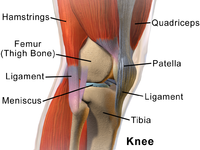
Photo from wikipedia
Bias in healthcare negatively impacts disparities in care, treatment, and outcomes, especially among minority populations. A scoping review of the literature was performed to provide a deeper understanding of how… Click to show full abstract
Bias in healthcare negatively impacts disparities in care, treatment, and outcomes, especially among minority populations. A scoping review of the literature was performed to provide a deeper understanding of how bias influences musculoskeletal pain and potential effects of bias-targeted interventions on reducing pain disparities, as well as identify gaps and make suggestions for further research in this area. Publications from peer-reviewed journals were searched using the databases PubMed/MEDLINE, PsycINFO, CINAHL, and Scopus, with 18 studies identified. The literature review revealed that clinician-based bias and discrimination worsen pain and disability by reducing access to treatment and increasing patient pain-related injustice, catastrophizing, depression, and perceived stress. In contrast, clinician education and perspective-taking, patient decision tools, and community outreach interventions can help reduce bias and disparities in musculoskeletal pain outcomes. Increasing the diversity of the healthcare workforce should also be a priority. Models of care focused on health equity may provide an ideal framework to reduce bias and provide sustainable improvement in musculoskeletal pain management.
Journal Title: Orthopaedic Nursing
Year Published: 2022
Link to full text (if available)
Share on Social Media: Sign Up to like & get
recommendations!